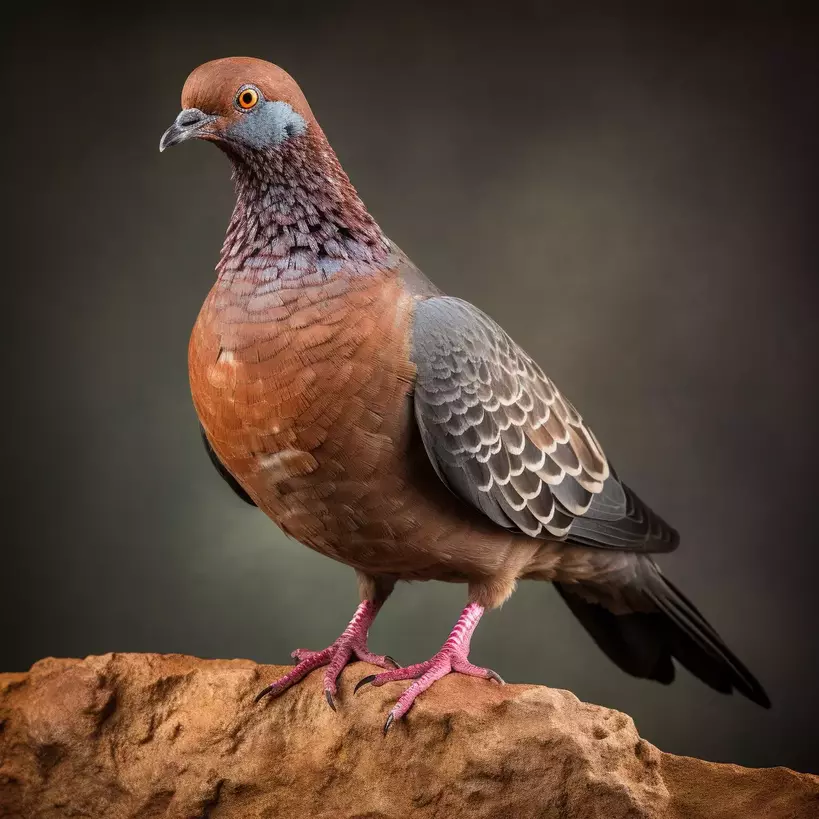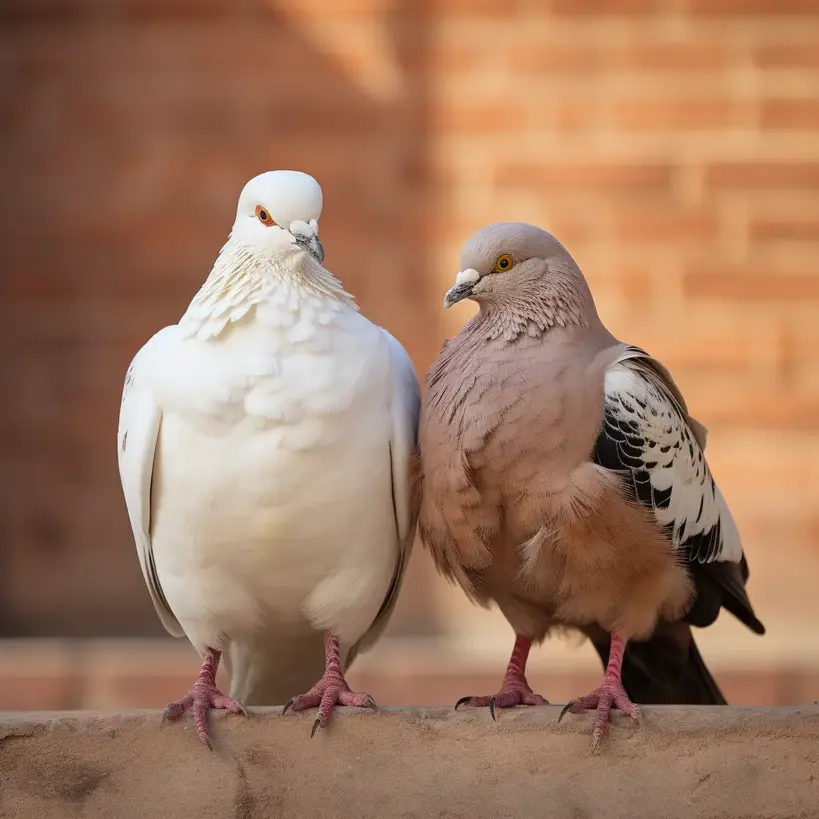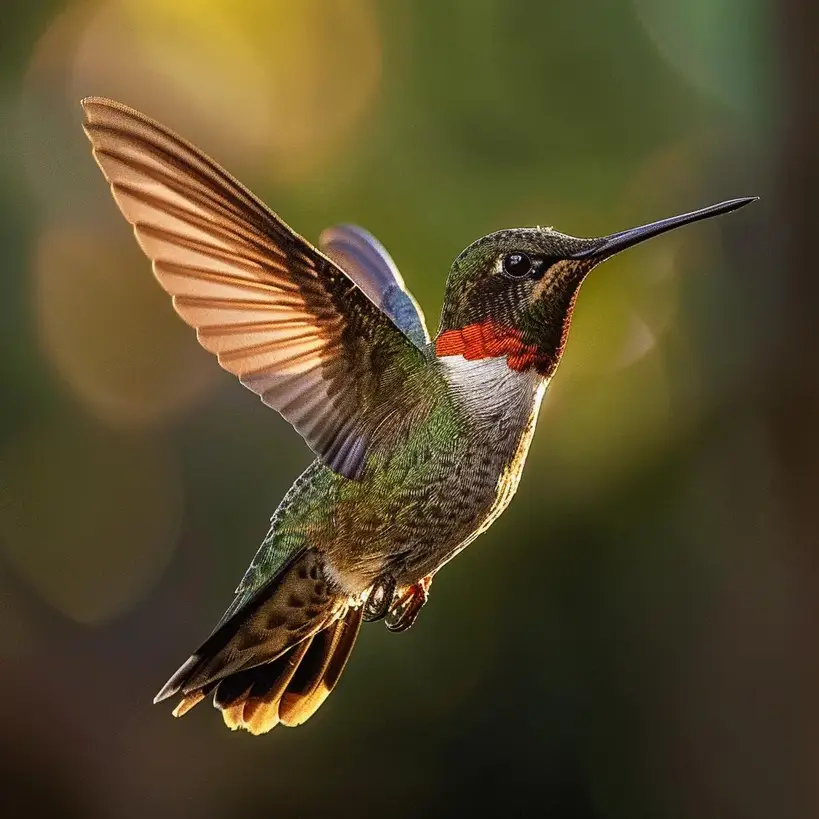When you think of pigeons, what comes to mind? For most of us, it’s the image of a grey or white bird cooing from a ledge or pecking at crumbs in a city square. But have you ever crossed paths with a brown pigeon? If you have, did you stop and think, “Hey, what’s the deal with this bird?”
Brown pigeons are more than just an oddity or a quirk of genetics. They are often seen as unique creatures with their own set of spiritual meanings and significance. From their distinctive color to their unique behaviors, brown pigeons are a subject worth exploring, not just for avid birdwatchers but for anyone interested in spirituality.
In this article, we explore the rich tapestry of what pigeons generally symbolize, shedding light on their role as messengers, symbols of peace and love, representations of freedom and adaptability, and even reflections of urban life itself.
Contents
I. The Brown Pigeon: Not Your Everyday Pigeon
If you thought all pigeons were cut from the same cloth, think again! Brown pigeons offer a refreshing twist in the world of avians, boasting unique features that make them stand out from the crowd. So, what exactly sets the brown pigeon apart from its more commonly seen cousins? Let’s find out.

a) A Palette of Brown Shades
While we might be tempted to lump all brown pigeons into a single category, the truth is that their plumage can vary significantly. Some sport a rich, deep brown that resembles a warm cup of coffee, while others may have a lighter, more tawny hue that’s reminiscent of a sandy beach. These varying shades are not only visually appealing but could also signify different spiritual meanings, depending on the context in which they’re observed.
b) A Master of Camouflage
Ever wonder why you don’t see brown pigeons as often as their grey or white counterparts? Well, their unique coloring serves as a natural camouflage, allowing them to blend seamlessly into their environment. Whether they’re in a tree or among fallen leaves, their brown hue helps them go unnoticed, both by predators and humans alike.
c) Behavior: The Quiet Observer
The behavior of brown pigeons also sets them apart. Unlike the gregarious and often brazen urban pigeons, brown pigeons are generally more reserved. They are keen observers, seemingly more in tune with their surroundings. This subtle difference in behavior has been the subject of much intrigue, with some suggesting that it reflects the bird’s spiritual role as a quiet guide or observer in our lives.
d) The Call of the Brown Pigeon
Ever paid attention to the cooing of a pigeon? While it might sound similar across different types of pigeons, those with a keen ear may notice subtle differences in the calls of brown pigeons. These variations, while not yet fully understood, add another layer of complexity to these fascinating birds.
e) Survival Instincts
Lastly, brown pigeons seem to possess remarkable survival instincts. They are adept at finding food and shelter even in harsh conditions, exhibiting a resilience that’s nothing short of admirable. In spiritual terms, this adaptability could symbolize resourcefulness and the ability to withstand life’s challenges.
II. Specific Spiritual Significance of the Brown Pigeon
Pigeons have been revered in various societies for their qualities like peace, love, and freedom. In both Greek and Roman mythologies, the pigeon was linked to Aphrodite or Venus, the goddess of love. In Christianity, a white dove is often seen as a symbol of the Holy Spirit. Similarly, in Hinduism, the pigeon is a symbol of peace and love, and it is believed to be a messenger of death as well.
The brown pigeon, therefore, can be seen as a symbol that blends the universal qualities of a pigeon with the color brown. This combination makes the brown pigeon a symbol of grounded love, peace with nature, and a messenger between the earthly and divine realms. Here are some possible spiritual meanings:
1. Grounding and Stability
The color brown is strongly associated with the earth, and the earth is the element tied to grounding and stability. Brown pigeons, by their very nature, evoke this grounded energy. They navigate their way through bustling cities and quiet fields alike, always able to find their bearings.
Spiritually, the brown pigeon symbolizes our need to remain stable amidst life’s challenges, reminding us to stay connected to our roots. Just as the pigeon does not lose its way, even in a chaotic environment, the grounded person can navigate the complexities of life with poise and equanimity.
Being grounded also means being mentally and emotionally stable, having the ability to think clearly, make wise decisions, and not get swept up in emotional turmoil.
2. Humility and Modesty
Brown pigeons are not as flashy as some of their colorful avian counterparts; they exude a sense of modesty and humility that makes them somewhat overlooked. Spiritually, their humble appearance speaks volumes. In a world obsessed with ostentation and extravagance, the brown pigeon teaches us the value of simplicity and humility.
These qualities are not about low self-esteem or lack of ambition but are geared toward a focus on genuine relationships and meaningful experiences. The humble person, like the brown pigeon, doesn’t need to be the center of attention to be content or make an impact.
3. Transformation and Renewal
Pigeons are creatures of habit, but they are also highly adaptable. They can make their homes in urban skyscrapers or rural barns, finding ways to survive and thrive in different environments. This adaptability can be seen as a form of transformation and renewal.
In spiritual symbolism, the brown pigeon encourages us to embrace change and view it as an opportunity for growth. Life’s constant changes shouldn’t be something we fear; rather, they are pathways to new experiences and deeper understandings of ourselves. Every end is a new beginning, and like the brown pigeon, we have the capability to transform and renew ourselves as we journey through life.

4. Resilience and Reliability
One of the most remarkable traits of brown pigeons is their resilience. These birds survive in a variety of habitats, facing predators and human interference, yet they persevere. Their tenacity symbolizes our own need for resilience in facing life’s challenges.
Moreover, pigeons have been known for their reliability, historically serving as messengers during wars and emergencies. Their ability to reach their destination against all odds speaks to the idea of commitment and reliability. Spiritually, the brown pigeon suggests that, with determination and a strong sense of purpose, we can overcome obstacles and fulfill our responsibilities.
5. Spiritual Observers and Messengers
Pigeons, often seen perched high on buildings or trees, have a broad perspective of the world below them. This vantage point allows them to observe their surroundings carefully, taking note of opportunities and dangers alike. They serve as spiritual observers, reminding us to take a step back and look at the bigger picture in our own lives.
Additionally, their historical role as messengers conveys the importance of communication between the earthly and spiritual realms. A brown pigeon appearing in your life might be a sign that a message is coming your way. Its presence serves as a reminder to be open to receiving wisdom or insights, either from the people around you or from your own inner intuition.
III. White Pigeon vs. Brown Pigeon: A Comparison
When discussing bird symbolism, the role of color is fundamental. White and brown are two colors that carry their own symbolic weight, and when associated with birds, these colors can offer rich allegorical narratives. Here’s a closer look at how white and brown colors influence bird symbolism, specifically in a comparative manner.
White Birds: Purity, Spirituality, and Transcendence
White is often seen as a color symbolizing purity, innocence, and light. White birds like doves and swans are frequently associated with spiritual experiences, representing a connection to the divine or ethereal realms. In Christianity, the white dove is a well-known symbol of the Holy Spirit, embodying qualities like peace, purity, and divine guidance. In other spiritual and cultural traditions, too, white birds often signify positive and uplifting qualities, such as hope, faith, and purity.
In literature and folklore, the appearance of a white bird is often a sign of good fortune or divine intervention. They’re seen as celestial messengers, bringing news or guidance from a higher plane of existence.

Brown Birds: Earthiness, Grounding, and Practicality
While white birds often symbolize ethereal qualities, brown birds—like the brown pigeon or sparrow—often represent more grounded, earthly attributes. The color brown is symbolic of the Earth, stability, and a sense of grounding. Brown birds can be interpreted as messengers reminding us to connect with the Earth, to be present in the material world, and to find stability in our lives. They also can symbolize the hidden potential within the ordinary, a message to look closer and dig deeper into the seemingly mundane aspects of life.
Brown birds often evoke the need for inner reflection, a connection to one’s roots, and a harmonious relationship with nature. Their understated color allows them to blend into their surroundings easily, symbolizing adaptability, practicality, and humility.
Comparative Analysis: White vs. Brown
- Divine vs. Earthly Realms: White birds are often linked with the heavens, spirituality, and divine guidance. Brown birds, on the other hand, evoke the Earth and earthly experiences, serving as a reminder to be grounded and connected to our roots.
- Transcendence vs. Immanence: The white color in birds often signifies a transcendent quality, indicating an ability to go beyond the earthly plane. Brown birds symbolize immanence, the divine present in the natural world, calling us to seek spiritual significance in our immediate environment.
- Visibility vs. Camouflage: White birds are usually more visible, drawing attention to themselves and therefore, to the message they bring. Brown birds blend into their surroundings, often going unnoticed but offering wisdom to those who pay attention.
- Purity vs. Complexity: White is often associated with purity and simplicity, offering a clear, unambiguous message. Brown, however, invites us to explore complexity—within ourselves and the world—suggesting that there’s more than meets the eye.
- Universality vs. Contextuality: The symbolism of white birds is often universal, cutting across various cultures and religions. The symbolism of brown birds can be more contextual, varying depending on the specific species, location, and situation.
The color of a bird greatly influences its symbolic meaning, adding layers of interpretation that can be both personal and cultural. Both serve as messengers, but while white birds might be seen as delivering celestial or universal truths, brown birds offer wisdom that is deeply connected to earthly experiences and individual introspection.
IV. The Brown Pigeon in Dreams
Dreams are often considered a playground for the subconscious, a realm where the mind explores themes, concerns, hopes, and fears that might not be readily apparent in our waking life. The appearance of specific symbols like animals or birds can be a rich source of interpretation, offering clues to the dreamer’s inner world. When it comes to dreaming of a brown pigeon, this seemingly simple bird takes on layers of symbolic meaning. Here are some common dream scenarios featuring a brown pigeon and possible interpretations for each:
1. The Brown Pigeon as a Messenger
Dream Scenario: A brown pigeon delivers a letter or message to you in the dream.
Interpretation: This could be seen as a call to pay attention to communication in your life, both with the divine and with the people around you. The brown pigeon as a messenger could signify the need to be more attentive to the unspoken, subtle cues from your environment or the need to listen to a message from your inner self or higher power.
2. The Brown Pigeon and Your Path
Dream Scenario: You follow a brown pigeon through various landscapes.
Interpretation: The dream might be suggesting that you are on a journey, seeking stability and grounding (as symbolized by the brown color of the pigeon). Your path might require adaptability and practicality, but it will ultimately lead to a more grounded sense of self.
3. The Brown Pigeon in Flight
Dream Scenario: The brown pigeon takes flight, soaring up into the sky or across horizons.
Interpretation: This could symbolize your own aspirations to break free from a restrictive situation. The earthy color of the pigeon suggests that your ambitions are grounded in reality and thus achievable. Alternatively, the bird’s flight might signify a desire for spiritual elevation, albeit one that is grounded in earthly experience.
4. Feeding a Brown Pigeon
Dream Scenario: You feed a brown pigeon, and it comes to eat from your hand.
Interpretation: This dream could indicate a need for emotional or spiritual nourishment. The act of feeding symbolizes care and compassion, possibly suggesting that it’s time to be kind to yourself or to others in your waking life. The brown pigeon, symbolic of earthiness, may be encouraging you to seek sustenance through natural, simple means.
5. A Flock of Brown Pigeons
Dream Scenario: You encounter a flock of brown pigeons, all gathering around a particular area or flying together.
Interpretation: A flock usually signifies community and shared purpose. This dream might be telling you to consider the communities you are a part of and how you contribute to them. The brown color adds a layer of meaning, possibly encouraging you to build communities that are grounded and practically supportive.
6. An Injured or Sick Brown Pigeon
Dream Scenario: You come across a brown pigeon that is injured or sick.
Interpretation: This might symbolize vulnerabilities or challenges in your life that you’ve overlooked but need attending to. Because the pigeon is brown, these issues may pertain to your sense of grounding or stability, perhaps suggesting that you reassess what makes you feel secure and rooted.
While dreams are highly subjective experiences that can be influenced by a multitude of factors, including individual experiences and cultural background, the symbolism of the brown pigeon in dreams often serves as a prompt for introspection and self-analysis. Whether serving as a messenger, guide, or symbol of community, the brown pigeon in dreams calls us to find balance, nourishment, and meaning in our lives.
FAQs
1) Is a Brown Pigeon Rare?
Brown pigeons are not particularly rare; they are a common sight in many urban and rural settings. The color brown in pigeons is one of several hues that these birds can have, alongside white, gray, and even shades of iridescent coloration.
However, the frequency of seeing brown pigeons might vary depending on your location and the specific pigeon populations there.
2) What Should I Do if a Brown Pigeon Appears Frequently in My Life?
If a brown pigeon frequently appears in your life, you might consider what spiritual or symbolic meanings resonate with you. This recurring appearance could be a sign asking you to focus on grounding yourself, appreciating the simpler aspects of life, or even paying attention to messages or opportunities you have been overlooking.
As with any repeated symbol or sign, personal context is crucial, so consider what the appearance of the brown pigeon might mean in the context of your life experiences and challenges.
3) Can Brown Pigeons Be Kept as Pets?
Yes, brown pigeons, like other pigeons, can be kept as pets. They are generally social and intelligent birds and can adapt well to human care. However, it’s essential to provide them with a proper living environment, including a spacious cage or aviary, adequate nutrition, and social interaction. If you’re considering keeping a brown pigeon as a pet for spiritual or symbolic reasons, be sure to meet all of their physical and emotional needs.
4) Are Brown Pigeons Considered Good or Bad Luck?
The notion of whether brown pigeons are good or bad luck varies by culture and personal belief. In general, brown pigeons are not universally considered to be either good or bad luck. However, in the realm of symbolism, they are often associated with positive traits like grounding, practicality, and the appreciation of everyday life.
If you find that the appearance of a brown pigeon resonates with you in some positive way, you might consider it a sign of good fortune or an auspicious omen.
5) How Do Brown Pigeons Differ from Other Types of Pigeons in Spiritual Terms?
In spiritual terms, the color of the pigeon adds a layer of meaning to the symbolism commonly associated with these birds. While pigeons in general are often seen as symbols of peace, communication, and community, the brown pigeon specifically introduces themes of grounding, stability, and the sanctity of the ordinary.
Unlike white pigeons, which are often associated with divine messages, celestial guidance, and purity, brown pigeons offer a counterpoint that is rooted in the earth, emphasizing the need for practicality and a balanced approach to life.
Final Thought
In conclusion, the symbolism and spiritual significance of brown pigeons offer a nuanced understanding of these often-overlooked birds. While they might not capture the imagination as vividly as their white counterparts, which are frequently associated with peace and divinity, brown pigeons bring to the table their own rich tapestry of meaning. Grounding, practicality, and the beauty found in everyday life are themes that these earth-hued birds often encapsulate.
Whether appearing in dreams or crossing your path in the waking world, a brown pigeon prompts consideration of our roots, our basic needs, and our most fundamental human experiences. Through their recurring presence, they might serve as messengers reminding us to balance our spiritual aspirations with the necessities and joys of earthly life.
As common as they are in many urban and rural landscapes, their frequent appearance should not be dismissed, but rather seen as a call to appreciate the complexities and miracles inherent in what we might consider the mundane.


